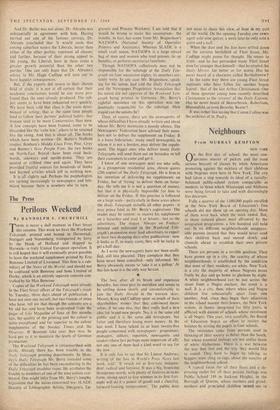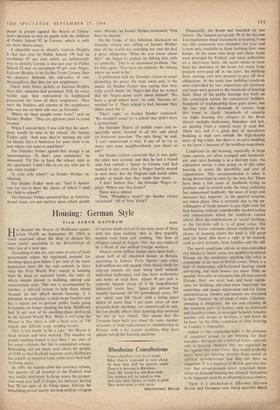Neighbours
From MURRAY KEMPTON
NEW YORK
ON the first day of school, the most con- spicuous muster of pickets and the most serious boycott of classes by white Americans
protesting against the mixture of their children with Negroes were here in New York. The city had taken a step towards its ideal of a racially- balanced public-school system comparable in modesty to those which Mississippi and Alabama were being forced to take and with distressingly less decorum.
Fully a quarter of the 1,080,000 pupils enrolled in the New York Board of Education's free schools did not show uP on opening day. Most of them were back when the week ended. But, in those isolated places most affronted by the integration programme, a few hundred still held out. In six different neighbourhoods unappeas- able parents insisted that they would never send their children back and moved slowly and clumsily ahead to establish their own private schools.
These are persons in a terrible position. They have grown up in a city, the sanctity of whose neighbourhoods is established by the condition that most of their residents are white. New York is a city the majority of whose Negroes move freely by day and go home to ghettoes by night. A white neighbourhood can be just across the street from a Negro enclave; the street is a wall. It is a city, then, where white and Negro children live substantially apart from one another. And, since they begin their education in the school nearest their homes, the New York system, in theory integrated for fifty years, is afflicted with dozens of schools whose enrolment is all Negro. This year, very carefully, the Board of Education began an effort to restore the balance by mixing the pupils in four schools.
The resistance came from persons used to thinking of their society as better than the South, but whose essential feelings are not unlike those of white Alabamans. There is a war between the way they feel and the way they would like to sound. They have to begin by talking, as beggars must cling to rags, about the sanctity of the neighbourhood school.
A typical focus for all their fears and a de- pressing outlet for all their private feelings was Public School 149 in Jackson Heights, in the Borough of Queens, whose mothers and grand- mothers and principled childless turned out to
picket in protest against the Board of Educa- tion's decision to mix its pupils with the children of Public School 92 in Corona, which is only six short blocks away.
A plausible way to identify Jackson Heights is that last year its Public School 149 had an enrolment 87 per cent white; an indisputable way to identify Corona is that last year its Public School 92 had an enrolment 99 per cent Negro. Jackson Heights is no farther from Corona than the distance between the sidewalks of one. thoroughfare. But they are not neighbours.
There were fewer pickets at Jackson Heights than their sponsors had promised. Still, by every visible sign, they represented in heightened possession the votes of their neighbours. They Were the Insiders and anyone of the neighbours who was not on their side was an Outsider.
'Where do these people come from?' said an Insider Mother. 'They are agitators paid to stand around.'
'When I moved here, I was told that the apart- ment would be next to the school,' the Insider Father said. 'And now they're moving my kid six blocks. Isn't it American for your child to be sent where you want to send him?'
The Outsider Father agreed that change is an inconvenience. 'If that's your complaint,' he answered. 'Ed like to have the school right in my apartment. I don't like to see my wife put to any extra trouble.'
'Is your wife white?' an Insider Mother ex- claimed.
The Insider Father went on: 'Isn't it Ameri- can for me to have the choice of where I send my child to school?'
The Outsider Father answered that, in America, moral issues are not matters upon which people vote. 'Morals,' an Insider Mother exclaimed. 'You have no morals.'
On the fringe of this Athenian discussion an Outsider citizen was telling an Insider Mother that all the world was watching her and she had a great obligation. 'What do you know about this?' she began to explain by hitting him with an umbrella. 'This is an emotional problem.' She hit him again. 'You have no children. We belong where we want to be.'
A policeman told the Outsider citizen to cease disturbing the peace. He went away and, in the peace, an Insider Father was saying that they truly cared about the Negro but that he wished that the Negro cared more about himself. 'We have a good school here,' he said, 'because we worked for it. Their school is bad, because they didn't work for it.'
'That's right,' an Insider Mother explained. 'We wouldn't stand for a school that didn't have a gymnasium.'
An Outsider Negro, of middle years and re- spectable mien, listened to all this and asked an irrelevant question. 'The only thing,' he said, 'I can't •understand is why, if any of us try to move into your neighbourhood, you chase us out?'
An Insider citizen answered that it was quite the other way around, and that he had a friend who had owned a house in Corona and had wanted to stay even after a Negro family moved in next door, but the Negroes had hated white people so much that they made him move.
'I don't believe that,' the Outsider Negro re- plied. 'Where was that house?'
There was a silence.
Then, 'Whaddaya want?' the Insider citizen exclaimed. 'All of New York?'





























 Previous page
Previous page